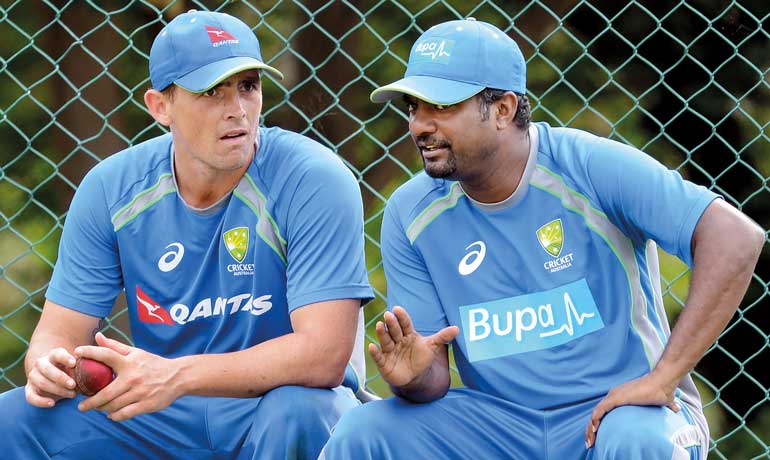Tuesday Feb 24, 2026
Tuesday Feb 24, 2026
Thursday, 4 August 2016 00:00 - - {{hitsCtrl.values.hits}}
 Australia’s bowling consultant, Sri Lankan former cricketer Muttiah Muralitharan (R) speaks with Australian cricketer Stephen O’Keefe (L) during a practice session at the Pallekele International Cricket Stadium in Pallekele on 23 July – AFP
Australia’s bowling consultant, Sri Lankan former cricketer Muttiah Muralitharan (R) speaks with Australian cricketer Stephen O’Keefe (L) during a practice session at the Pallekele International Cricket Stadium in Pallekele on 23 July – AFP
AFP: Sri Lanka’s first win over Australia in two decades proves the islanders have the talent to step into the boots of their recently retired greats, according to Test cricket’s most successful bowler Muttiah Muralitharan.
Speaking to AFP ahead of the second Test in Galle which begins tomorrow, Muralitharan reflected in glowing terms on batsman Kusal Mendis and spin bowler Lakshan Sandakan’s key roles in last weekend’s thrilling victory in Pallekele even though both are newcomers to Test cricket.
Muralitharan, who is a member of the Australia squad’s tour coaching staff, has been involved in a war of words with Sri Lanka’s board, bitter that his old employers have not sought out his advice themselves.
But the man whose 800 Test wickets remains a world record six years after retiring has been keeping a close eye on Sri Lanka’s rebuilding efforts after the departure of some of the finest players in their history.
Despite his current role for Australia, Muralitharan was delighted by the performances of Mendis, who hit a maiden Test ton in Pallekele, and in particular that of Sandakan who took seven wickets on his debut. It was only Sri Lanka’s second Test victory over Australia and the first since 1999.
But Muralitharan cautioned that Sandakan – a left-arm wrist spinner who got some dramatic turn in Pallekele – would need careful mentoring if he is to achieve his full potential and not fall by the wayside.
“There’s no doubt about the talent we have. Those two young guys have bright futures ahead of them,” Muralitharan said. “But the thing is we need to nurture them.”
Muralitharan, a former off-spinner, said he was “really impressed” with the 25-year-old Sandakan who took 4 for 58 in the first innings.
But he said the fate of Ajantha Mendis – another Sri Lankan spinner whose Test career fizzled out after an impressive start – should serve as a cautionary tale.
“Look at what happened to (Ajantha) Mendis. He took a truckload of wickets at the start. But when he went through a couple of lean series, he was put under pressure and then went into a defensive mindset,” he said. “Today he is nowhere.”
Talent spotting
Muralitharan said he was fortunate to have had a “strong leader” like Arjuna Ranatunga who skippered Sri Lanka to victory in the 1996 World Cup.
“He (Ranatunga) was great in spotting talent and then guiding them,” Muralitharan said.
“He backed players even when they failed repeatedly. Then they repaid his faith big time. All the players who came into the national side when he was captain went on to have long and successful careers.”
The 1996 triumph ushered in a golden age as Sri Lanka churned out a succession of top-class players.
When established batsmen such as Ranatunga and Aravinda de Silva stepped aside, they were replaced by the likes of Kumar Sangakkara and Mahela Jayawardene who became Sri Lanka’s two highest run scorers.
Both have retired in the past two years and other stars such as dashing opener Tillakaratne Dilshan and slingy fast bowler Lasith Malinga have also quit Test cricket.
Meanwhile their best bowler, spinner Rangana Herath, is now 38 and has hinted at retirement.
As a result, Sri Lanka have slid down the Test rankings to seventh, making their victory over the top-ranked Australians all the more impressive.
Muralitharan said Australia’s bowlers had struggled to adapt to Sri Lankan pitches.
“The Australians are not good at playing in these conditions and that’s why they hired me,” he said.
“They play 80 percent of their cricket on fast and bouncy surfaces and it’s only natural that they will struggle in conditions like these.”
Australia’s players and management have praised Muralitharan’s efforts to help the likes of off-spinner Nathan Lyon but he acknowledged he could only do so much.
“Simply because I coach, they can’t win. It’s a process and you need to master that process over a long period of time,” he said.